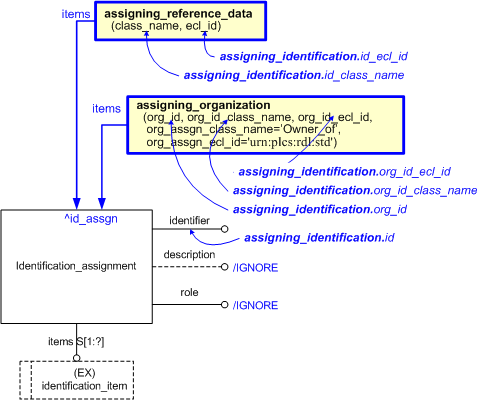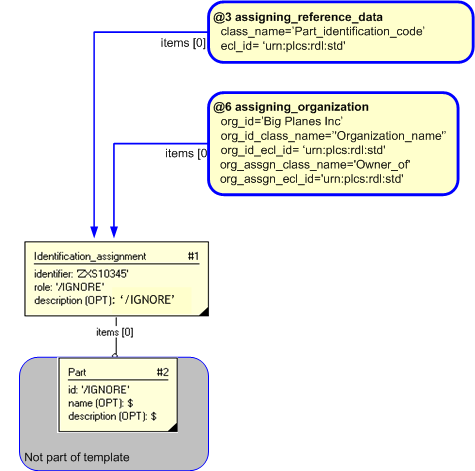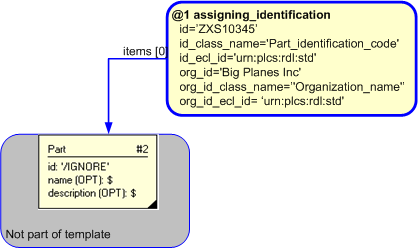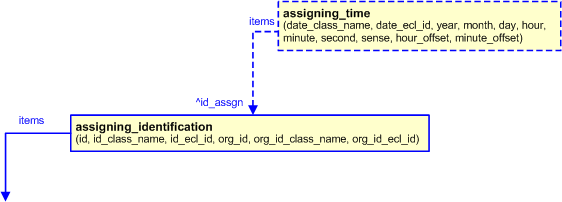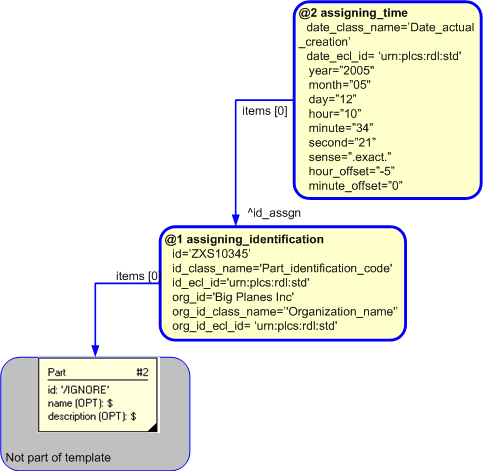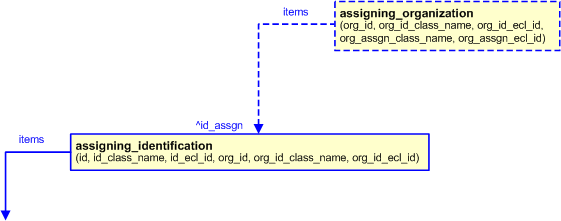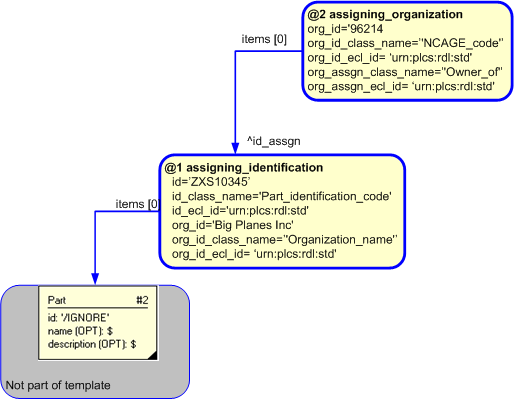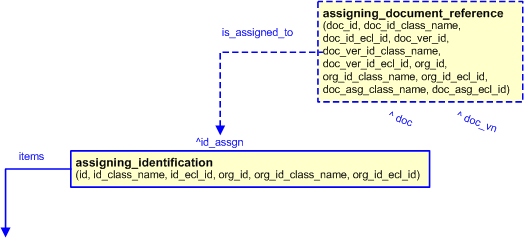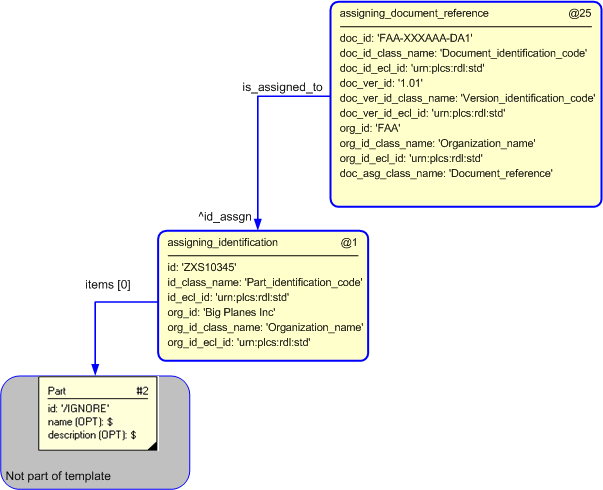Template:— assigning_identification (asg_id)
Capability:assigning_identifiers |
Date: 2010/01/25 22:45:14
Revision: 1.27
|
This section specifies the template assigning_identification.
NOTE
The template has been defined in the context of the capability
assigning_identifiers
which provides an overall description of the
relevant parts of the ISO 10303-239 information model and a description
of related templates.
NOTE
An explanation of a template and the associated instantiation path is
provided in the
Template overview
section.
This template describes the assignment of an identifier to something. Each identifier must be
defined in the context of an organization.
The type or role of the identifier is provided by assigning reference data to the identification assignment and thereby, classifying
the
identification assignment as a sub class of
"Identifier type"
(urn:plcs:rdl:std:Identifier type).
Note:
As explained in the DEXLIB help pages (dexlib/help/dex/impl_trans.htm), when the id is not known or is not provided - (for
example versions of a part may not be known), the suggestion is to use /NULL string, to indicate that this value is not supported.
In other words, a default identification of the item (e.g. /NULL) should still be provided by the owner, when the value is
unknown.
Note:
The template does not, and is not, designed to build any intelligent structure into the identification provided; it is considered
a dumb string. If the template is used tp provide an 'intelligent' string, it is only of significance to those party to an
exchange agreement (which is outside the scope of this template).
The EXPRESS-G diagram in
Figure
1
shows the templates and EXPRESS entities that are required
to represent the template
"assigning_identification".
The text highlighted in blue shows the template parameters.
Figure 1 — Template Configuration for Assigning Identification
The graphic for the template to be used in other EXPRESS-G diagrams
is shown in Figure
2
below.
Figure 2 — Template Summary
The following input parameters are defined for this template:
The identifier being assigned.
The name of the class used to classify the identifier (@id) and so
provide the role or reason for the identification.
The following classes and their sub-classes can be used:
id_ecl_id (Default=urn:plcs:rdl:std,Type='URN')
The identifier of the organization that
"owns" the identifier.
The name of the class being used to classify the
identification of the organization, or the organization name (@org_id). For example CAGE code.
The following classes and their sub-classes can be used:
The items to which the identification is assigned
The following reference parameters are defined for this template:
%^target = $assigning_identification.id_assgn%
For example, to identify the date of an identification by assigning
a date to the
Identification_assignment
entity. E.g.
-- The template assigning_identification has an external reference
-- id_assgn. Bind this to the local external reference
-- id_assignment. It can now be the target for assigned dates
%^id_assgn = $assigning_identification.id_assgn%
-- assign date to identification_assignment in the role of "created"
/assigning_calendar_date(items=^id_assgn,
date_class_name='Date_actual',
date_ecl_id='urn:plcs:rdl:std',
year=@creation_year,
month=@creation_month,
day=@creation_day)/
The following parameter combinations specify a uniqueness constraint:
Unique constraint: Unique identifier
Any given identifier shall only be assigned to an item once.
The instantiation path shown below specifies the entities that are to be
instantiated by the template.
A description of templates and the syntax for the instantiation path is
provided in the
Templates Help/Information section.
The following entities are instantiated with attributes as specified:
The instance diagram in Figure
3
shows an example of the EXPRESS entities and templates that are instantiated by the template:
/assigning_identification(items='#2', id='ZXS10345', id_class_name='Part_identification_code', id_ecl_id='urn:plcs:rdl:std', org_id='Big Planes Inc', org_id_class_name='Organization_name', org_id_ecl_id='urn:plcs:rdl:std')/
(an illustration of the consolidated assigning_identification template is shown in
Figure
4 below.)
Note that the
assigning_reference_data and
assigning_organization templates are used in the diagram.
Namely:
/assigning_reference_data(items='#2', class_name='Part_identification_code', ecl_id='urn:plcs:rdl:std')/
/assigning_organization(items='#2', org_id='Big Planes Inc', org_id_class_name='Organization_name', org_id_ecl_id='urn:plcs:rdl:std', org_assgn_class_name='Owner_of', org_assgn_ecl_id='urn:plcs:rdl:std')/
Figure 3 — Instantiation of Template Components
The instance diagram in
Figure
4
shows the graphic symbol for the template that is to be
used in other instance diagrams. The example template is:
/assigning_identification(items='#2', id='ZXS10345', id_class_name='Part_identification_code', id_ecl_id='urn:plcs:rdl:std', org_id='Big Planes Inc', org_id_class_name='Organization_name', org_id_ecl_id='urn:plcs:rdl:std')/
Figure 4 — Consolidated Template Instantiation
The following section details how the
assigning_identification
template can be optionally characterized by assigning
other constructs to it. These are characterizations commonly
applied to the template. The ISO 10303-239 EXPRESS model may enable
other assignments to the entities instantiated by the template.
The following characterizations may apply:
Characterization Assigning Time
NOTE this characterization is optional.
Times and dates can be associated with the assignment of an identifier by
using the template
assigning_time.
For example, the time and date on which an identifier was created
is represented by assigning a time to the
Identification_assignment.
The model for assigning a time (and/or date) to an identifier is shown below.
Figure 5 — Template Configuration with Optional Time and date Assignment
An example showing the assignment of a creation time (and/or date) to an identifier is shown below.
Figure 6 — Instantiation of Optional Template Configuration
The instantiated templates for assigning a identification to a part
is:
/assigning_identification2(items='#2', id='ZXS10345', id_class_name='Part_identification_code', id_ecl_id='urn:plcs:rdl:std', org_id='Big Planes Inc', org_id_class_name='Organization_name', org_id_ecl_id='urn:plcs:rdl:std')/
The instantiated templates for assigning a time (and/or date) to an identification
is shown below. Note the use of the reference parameter
$assigning_identification.id_assgn to identify the
Identification_assignment
instantiated by the template assigning_identification.
/assigning_time(items='$assigning_identification.id_assgn', date_class_name='Date_actual_creation', date_ecl_id='urn:plcs:rdl:std', year='2005', month='05', day='12', hour='10', minute='34', second='21', sense='.exact.', hour_offset='-5', minute_offset='0')/
Characterization Assigning Organization
NOTE this characterization is optional.
An additional representation of an organization can be associated with the assignment of an identifier by
using the template
assigning_organization.
For example, to specifiy both the Organization name AND an NCAGE of the Organization that is responsible
for an identifier can be represented by associating an instance of the assigning_organization template to the
Identification_assignment entity that is referenceable from the
assigning_identification template.
The model for assigning an additional organization to an identifier is shown below.
Figure 7 — Template configuration with optional organization assignment
An example showing the assignment of an additional organization to an identifier is shown below.
Figure 8 — Instantiation of optional template configuration
The instantiated templates for assigning a identification to a part
is:
/assigning_identification2(items='#2', id='ZXS10345', id_class_name='Part_identification_code', id_ecl_id='urn:plcs:rdl:std', org_id='Big Planes Inc', org_id_class_name='Organization_name', org_id_ecl_id='urn:plcs:rdl:std')/
The instantiated templates for assigning an additional representation of the organization to an identification
are shown below. Note the use of the reference parameter
$assigning_identification.id_assgn to identify the
Identification_assignment
instantiated by the template assigning_identification.
/assigning_organization(items='$assigning_identification.id_assgn', org_id='96214', org_id_class_name='NCAGE_code', org_id_ecl_id='urn:plcs:rdl:std', org_assgn_class_name='Owner_of', org_assgn_ecl_id='urn:plcs:rdl:std')/
Characterization Assigning Document Reference
NOTE this characterization is optional.
A document reference can be associated with the assignment of an identifier by using the template
assigning_document_reference.
For example, to reference the documented procedure or specification that is used in creating an identifier
can be represented by associating an instance of the assigning_document_reference template to the
Identification_assignment entity that is referenceable from the
assigning_identification template.
The model for assigning an document reference to an identifier is shown below.
Figure 9 — Template configuration with optional document reference assignment
An example showing the assignment of a document reference to an identifier is shown below.
Figure 10 — Instantiation of optional template configuration
The instantiated templates for assigning a identification to a part
is:
/assigning_identification2(items='#2', id='ZXS10345', id_class_name='Part_identification_code', id_ecl_id='urn:plcs:rdl:std', org_id='Big Planes Inc', org_id_class_name='Organization_name', org_id_ecl_id='urn:plcs:rdl:std')/
The instantiated templates for assigning a document reference to an identification
are shown below. Note the use of the reference parameter
$assigning_identification.id_assgn to identify the
Identification_assignment
instantiated by the template assigning_identification.
/assigning_document_reference(doc_id='FAA-XXXAAA-DA1', doc_id_class_name='Document_identification_code', doc_id_ecl_id='urn:plcs:rdl:std', doc_ver_id='1.01', doc_ver_id_class_name='Version_identification_code', doc_ver_id_ecl_id='urn:plcs:rdl:std', org_id='FAA', org_id_class_name='Organization_name', org_id_ecl_id='urn:plcs:rdl:std', doc_asg_class_name='Document_reference', doc_asg_ecl_id='urn:plcs:rdl:std', is_assigned_to='#1')/
